Miltons Socratic Rationalism
Politics, Literature, and Film
Series Editor: Lee Trepanier, Saginaw Valley State University
The Politics, Literature, and Film series is an interdisciplinary examination of the intersection of politics with literature and/or film. The series is receptive to works that use a variety of methodological approaches, focus on any period from antiquity to the present, and situate their analysis in national, comparative, or global contexts. Politics, Literature, & Film seeks to be truly interdisciplinary by including authors from all the social sciences and humanities, such as political science, sociology, psychology, literature, philosophy, history, religious studies, and law. The series is open to both American and non-American literature and film. By putting forth bold and innovative ideas that appeal to a broad range of interests, the series aims to enrich our conversations about literature, film, and their relationship to politics.
Advisory Board
Richard Avaramenko, University of Wisconsin-Madison
Linda Beail, Point Loma Nazarene University
Claudia Franziska Brhwiler, University of St. Gallen
Timothy Burns, Baylor University
Paul A. Cantor, University of Virginia
Joshua Foa Dienstag, University of California at Los Angeles
Lilly Goren, Carroll University
Natalie Taylor, Skidmore College
Ann Ward, University of Regina
Catherine Heldt Zuckert, University of Notre Dame
Recent Titles
Milton's Socratic Rationalism: The Conversations of Adam and Eve in Paradise Lost by David Oliver Davies
Walker Percy and the Politics of the Wayfarer by Brian A. Smith
Romanticism and Civilization: Love, Marriage and Family in Rousseaus Julie by Mark Kremer
Aldous Huxley: The Political Thought of a Man of Letters by Alessandro Maurini
Sinclair Lewis and American Democracy by Steven Michels
Liberty, Individuality, and Democracy in Jorge Luis Borges by Alejandra M. Salinas
Miltons Socratic Rationalism
The Conversations of Adam and Eve in Paradise Lost
David Oliver Davies
LEXINGTON BOOKS
Lanham Boulder New York London
Published by Lexington Books
An imprint of The Rowman & Littlefield Publishing Group, Inc.
4501 Forbes Boulevard, Suite 200, Lanham, Maryland 20706
www.rowman.com
Unit A, Whitacre Mews, 26-34 Stannary Street, London SE11 4AB
Copyright 2017 by Lexington Books
All rights reserved . No part of this book may be reproduced in any form or by any electronic or mechanical means, including information storage and retrieval systems, without written permission from the publisher, except by a reviewer who may quote passages in a review.
Milton: Paradise Lost, Alistair Fowler, Copyright 2014 Taylor and Francis. Reproduced by permission of Taylor & Francis Books UK
British Library Cataloguing in Publication Information Available
Library of Congress Cataloging-in-Publication Data
Library of Congress Control Number: 2017945465
ISBN 978-1-4985-3262-4 (cloth : alk. paper)
ISBN 978-1-4985-3263-1 (electronic)
 The paper used in this publication meets the minimum requirements of American National Standard for Information SciencesPermanence of Paper for Printed Library Materials, ANSI/NISO Z39.48-1992.
The paper used in this publication meets the minimum requirements of American National Standard for Information SciencesPermanence of Paper for Printed Library Materials, ANSI/NISO Z39.48-1992.
Printed in the United States of America
For Becky
and
John and Kristen
and
Rachel
Contents
This book investigates a mode of discourse in Paradise Lost to which I was introduced many years ago in what Milton had called that shaded academy offered by Socratic streams. Fortune played some part as well. Happenstance had led me to a classroom lecture on Platos Symposium of Alfred Geier at the University of Rochester. For a number of years thereafter I came to read the dialogues of Plato and Xenophon et alia with him and other students of such works. UnlikeI can only hopeSatan on Mt. Niphates, I cannot forget the debt immense I yet owe to that teacher and those years.
Later I had the good fortune to be invited to teach in Core Curriculum programs in the undergraduate and doctoral degrees at the University of Dallas. Over the years reading and discussing the works in the curricula of these programs with undergraduate and graduate students and colleagues has provided the fertile ground in which the work at hand was nourished and grew. First of all, I am indebted beyond measure to John Alvis and Tom West for the example in a friendship of many years of their teaching, scholarship and, above all, of their tireless probing inquiry in conversation. Then too I have enjoyed the daily gift of adventitious talk on things Miltonic and otherwise with my colleagues in English, Classics, Politics and Philosophy: Debra Romanick Baldwin, Brett Bourbon, Scott Crider, Katherine Davis, Leo Paul de Alvarez, John Grant, Eileen Gregory, Theresa Kenney, Andrew Moran, Fr. Robert Maguire, Andrew Osborn, R.J. Pestritto, Greg Roper, Steven Stryer and Gerard Wegemer. Dr. Grace West read an early version of Eves First Words; Dr. Bourbon read a late version of Becoming Dear and Drs. Alvis and Roper read the completed manuscript. By pointed query, advice and example these colleagues have all refined and advanced my views of my subject. I am particularly grateful as well for opportunity on two occasions in the past to have audited Joshua Parens graduate seminar on Maimonides Guide which opened a new perspective for me on Miltons appropriations of Genesis.
In the summer of 1992 I was a participant in a National Endowment for the Humanities Summer Institute, the Arizona Milton Institute , directed by John Shawcross at the University of Arizona, Tucson, Arizona. In AY 20002001 I enjoyed the support of the Earhart Foundation Research Fellowship Grant during my sabbatical year, as well as, on two occasions, a summer research grant by the Haggar Fund at the University of Dallas.
Quotations from the text of Milton: Paradise Lost by Alastair Fowler (Editor) , Copyright (2007) Pearson Education Limited are reproduced with permission of Taylor & Francis Books UK.
Chapter 3, Eves First Words first appeared in Classical and Modern Literature 28.2 (1-31) (2008) as Eves First Words in Paradise: Ovidian Wit, Platonic Self-knowledge, and Miltons Translations in Paradise Lost 4.440-491. I remain grateful for the many helpful suggestions of an anonymous reader and the encouragement of the editor of CML , Michael Barnes, in my revision of this chapter. Likewise, I am grateful to the anonymous reviewer and editors at Lexington Books for their aid in revision of the introductory and concluding chapters of this book.
Here I must give recognition to the critical insight and simple generosity of a scholar whose approach to Milton anticipated my own. When I was yet an ABD candidate in Classics at the State University of New York at Buffalo, Paul Dowling of Canisius College, for afternoons conversation over a few lines of Euripidess Greek as a motto for Miltons tract on the liberty of unlicensed printing, Areopagitic a, granted me co-authorship in his essay, Shrewd books with dangerous Frontespieces: Areopagitica s Motto. Milton Quarterl y . Vol. 20, no. 2 (May 1986). Years later, in his completed book, Polite Wisdom (Rowman & Littlefield Publishers: 1995) on that Miltonic tract I came upon his call for just such an approach to Paradise Lost which I was now beginning to discern in Miltons appropriation of a Socratic Rationalism represented in the dialogues of Plato and Xenophon. I hope I have done justice in this book to his insight.
Finally, I am grateful beyond measure for the never-failing patience and encouragement of my wife, Beckynot to mention her assiduous care in proofreading every draft throughout the years of this project.

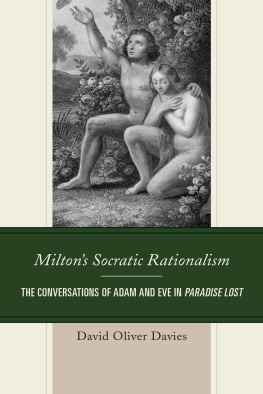

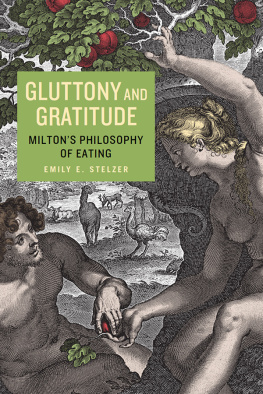
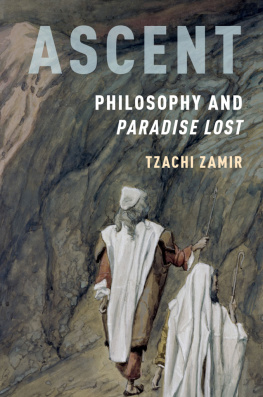
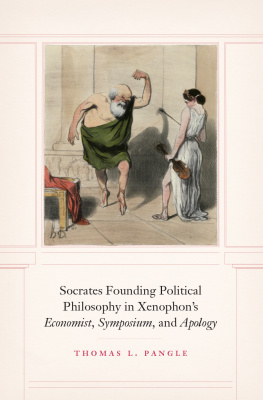

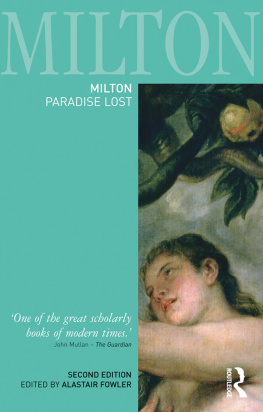

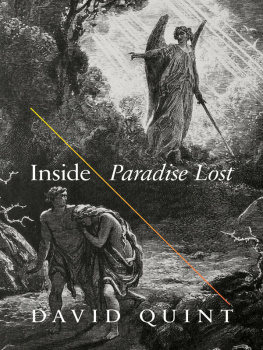

 The paper used in this publication meets the minimum requirements of American National Standard for Information SciencesPermanence of Paper for Printed Library Materials, ANSI/NISO Z39.48-1992.
The paper used in this publication meets the minimum requirements of American National Standard for Information SciencesPermanence of Paper for Printed Library Materials, ANSI/NISO Z39.48-1992.